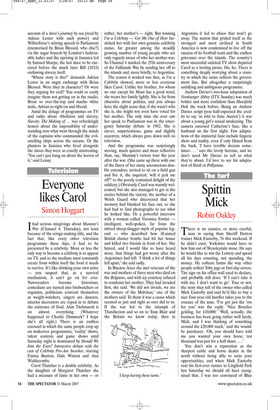Everyone likes Carol
Simon Hoggart
Ihad serious misgivings about Mummy’s War (Channel 4, Thursday), not least because of the cringe-making title, and the fact that, like every other television programme these days, it had to be presented by a celebrity. More or less the only way to become a celebrity is to appear on TV, and so the medium must constantly create from within itself the food it needs to survive. It’s like drinking your own urine — you suspect that, as a survival mechanism, it can’t go on for ever.
Newsreaders become historians, comedians are turned into birdwatchers or organists, politicians reinvent themselves as weight-watchers, singers are dancers, interior decorators are roped in to debate the existence of God. Alan Titchmarsh is on almost everything. (Whatever happened to Charlie Dimmock? I hope she’s all right.) There is an endless carousel in which the same people crop up on makeover programmes, ‘reality’ shows, talent contests and game shows until Saturday night is dominated by Should We Join the Euro? Interactive debate with the cast of Celebrity Pro-Am Snooker, starring Emma Bunton, Dale Winton and Ann Widdecombe.
Carol Thatcher is a double celebrity. As the daughter of Margaret Thatcher she had a measure of fame in her own — or rather, her mother’s — right. But winning I’m a Celebrity — Get Me Out of Here furnished her with her own genuine celebrity status, far greater among the steadily growing number of young people who are only vaguely aware of who her mother was. So Channel 4 marked the 25th anniversary of the Falklands War by sending her off to the islands and, more briefly, to Argentina.
The reason it worked was that, as I’m a Celebrity showed, more or less everyone likes Carol. Unlike her brother, for whom no one except his Mum has a good word, she wears her family lightly. She is far from obsessive about politics, and you always have the slight sense that, if she wasn’t who she is, she might not even have voted for her mother. The only time she ever saw her speak to Parliament was in the emergency Saturday debate in 1982. She is clever, unpretentious, game and slightly eccentric, which always goes down well on television.
And the programme was surprisingly moving, much quieter and more reflective than, say, Mummy’s victory tour the year after the war. (She came up there with one of the finest of her many unconscious double entendres; invited to sit on a field gun and fire it, she inquired, ‘will it jerk me off?’ to the poorly contained delight of the soldiery.) Obviously Carol was warmly welcomed, but she also managed to get at the stories behind the victory: the mother of a Welsh Guard who discovered that her memory had blanked his face out, so she had had to find photographs to see what he looked like. Or a powerful interview with a woman called Veronica Fowler intelligent, well-spoken, far from the inbred sheep-shagger myth of popular legend — who described how ill-aimed British cluster bombs had hit her house and killed two friends in front of her. She hinted, and I would like to have heard more, that things had got worse after the Argentines had left: ‘I think a lot of things fell apart,’ she said sadly.
In Buenos Aires she met veterans of the war and mothers of three men who died on the Belgrano, and with icy courtesy refused to condemn her mother. They had invaded first, she said. ‘We did not invade, we are the owners of the Malvinas,’ one of the mothers said. To them it was a cause which seemed as just and right as ours did to us. If the war led to the triumph of Thatcherism and so on to Tony Blair and the Britain we know today, then in Argentina it led to chaos that won’t go away. The nation that prided itself as the strongest and most civilised in South America is now condemned to live off the success of its football team and the endless grievance over the islands. The country’s most successful satirical TV show depicted Carol as a looting pirate. Ho, ho. There is something deeply worrying about a country in which the satire reflects the government line. But altogether a surprisingly satisfying and ambiguous programme.
Andrew Davies’s two-hour adaptation of Northanger Abbey (ITV, Sunday) was much bolder and more confident than Mansfield Park the week before. Being an Andrew Davies script (you half-expected the credits to say ‘as told to Jane Austen’) it was about a young girl’s sexual awakening. The camera caressed Catherine’s face, like a husband on the first night. Few adaptations of the immortal Jane include lingerie shots and nudity, even if only filmed from the back. ‘I have terrible dreams sometimes.. . ’ says the lovely heroine, and we don’t need Mr Davies to tell us what they’re about. I’d love to see his adaptation of Heidi or Pollyanna.










































































 Previous page
Previous page